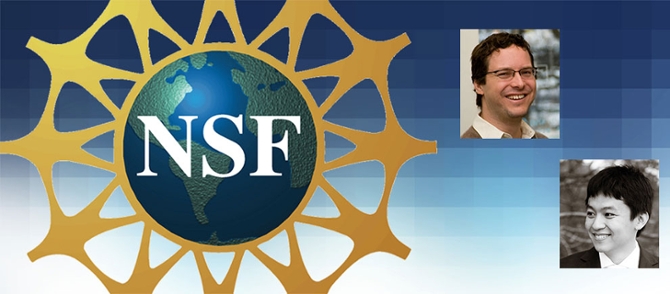Zhang & Gergle Receive NSF Grant from Cyber-Human Systems
Their project is titled, "CHS: Small: Coordination of Opportunistic Actions to Produce Globally Effective Behaviors for Physical Crowdsourcing."

Prof. Haoqi Zhang (Principal Investigator) and Prof. Darren Gergle (Co-Principal Investigator) have received an NSF grant from Cyber-Human Systems (CHS) on advancing physical crowdsourcing. Their project is titled, "CHS: Small: Coordination of Opportunistic Actions to Produce Globally Effective Behaviors for Physical Crowdsourcing" and is allotted from 2016 through 2019 in an amount totaling about $500,000.
Prof. Zhang and Prof. Gergle both serve as members of the Segal Research Council and are also faculty in the Technology and Social Behavior joint program. Prof. Zhang co-directs the Delta Lab, an interdisciplinary research lab and design studio at Northwestern University, whose driving mission is to improve the way we design, work, learn, play, and fundamentally change the way we interact. Prof. Gergle directs the CollabLab, whose research interest focuses on understanding and designing systems capable of supporting group interactions and communication in a variety of contextual environments.
Project Abstract: This project will develop theory, algorithms, and example systems for motivating large numbers of autonomous individuals to solve problems that require coordination in the physical world. In these "physical crowdsourcing" systems, people make small contributions toward a larger collective problem, such as tracking animal species or air quality for citizen science projects or providing rides or package delivery in peer economy systems like TaskRabbit and Uber. In these systems, opportunistically relying on people to do convenient parts of the problem causes incomplete solutions, while directing people to do inconvenient tasks requires high incentives. By modeling the timing and location of tasks, along with knowledge of people’s routines, the project will develop algorithms that make use of ideas from decision theory to best decide when, where and to whom to suggest tasks, in a way that balances individual convenience with system needs. Doing this should increase people's willingness to participate, reduce the need to incentivize participation, and create more complete, timely, and accurate solutions to the collective problem. The investigators will develop several prototype systems that address practical problems such as package delivery and lost and found searches to demonstrate the effectiveness of their ideas; they will also release a toolkit that allows other people to use their work when designing their own physical crowdsourcing systems for solving both scientific and practical problems of interest to society.
The work will be carried out in three main phases. The first phase will develop "incentive chaining", a strategy to encourage opportunistic contributors to become more directable. Using an existing prototype for surveying tree species, the team will model people's opportunistic contributions and routines, then suggest relatively easy "nearby" tasks where others have contributed but where further work is needed, building people's interest and capacity to contribute. Once the nearby collaborative tasks are done, the system will direct these experienced and motivated contributors toward new areas and tasks, which will in turn become the "nearby" contributions that attract the next round of contributors. The second phase will develop decision-theoretic hit-or-wait algorithms to decide if and when to notify contributors about tasks, using a community-based lost and found application. Building on the modeling of behavioral routines, these algorithms will use sequential decision processes to estimate the maximize total value of tasks that contributors will complete, given individuals' history and current state, the system-determined value of nearby tasks, and the system’s estimate of how likely the contributor would be to respond to a notification. The third phase will develop notification policies that satisfy the system's quality of service needs while minimizing disruption to contributors. To do this, the investigators will develop a supply management framework that considers the pool of available helpers, the current task demand and values, and a range of policies for making directed requests and evaluate it in the context of a peer-to-peer package delivery system.
About CHS: Through partnerships and engagements across diverse and emerging disciplines, CHS research brings novel technology, new perspectives, and new models of inquiry, practice, and scholarship to research and education in computer and information science. While diverse in approach, CHS research is grounded in theory and rooted in empirical methods to produce broadly applicable and transferable results that advance the knowledge and practice around cyber-human systems.
